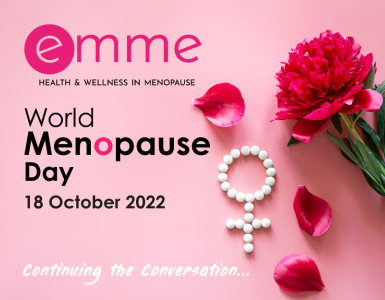Stage one in my mission to take control of whats coming.
So here we go, with the first steps in my mission to take full control of the next chapter in my life. This is me, grabbing hold of the inevitable arrival of the menopause and getting ready to say “I’ve been expecting you….”
To start understanding what the menopause actually means, I gave the AMAZING Dr. Sherry a call. She told me to pull up a chair, pour a large martini and fire away with my questions.
I suggest you grab yourself a cocktail too…
Dr Sherry! I know nothing about the menopause. All I know is that I am ever so slightly terrified about the thought of ‘going through the change’, as I have only ever heard tales of the following:
- Hot burning flushes
- Insomnia
- Mood swings/Stories of women losing their sh**t over nothing
- Vaginal dryness
- Memory Loss
- A stomach that will never leave your body
So, I am hoping you can offer me some reassurance, that there are things I can do to make sure that my transition ‘through the change’ will not be as horrific as I think it is going to be.
Can I start by asking if you think, that at 45/6 years old, I am starting to go through the change?
By the age of 45 or so, there’s a good chance you have already considered how peri-menopause would affect you. There’s no accident that this period of hormonal disruption has been referred to for years as the start of “the change.” You’ve most likely wondered: how will “the change” change me? So what exactly happens in peri-menopause. Pre-menopause and peri-menopause mean the same thing since both refer to the years before menopause.
It’s different for everyone, but the constant questions I hear are: Will I have crazy uncontrollable bleeding for weeks on end? Will drenching sweats come on when least expected? Will sex become painful and sexual intimacy a thing of the past?
To you all I say hold on there. First let’s talk about what exactly happens in perimenopause.
Peri-menopause
Peri-menopause happens when your ovaries stop functioning consistently, thereby upsetting your normal hormonal rhythm. This hormonal change usually happens within 10 years of menopause. The erratic and disruptive symptoms of peri-menopause tend to mark the beginning of menopause. Every decade brings about some emotional and physical change, but for women, the decade of one’s forties may pack the biggest punches of all. Between the typical 40-something anxieties of shifting relationships (divorce and dealings with hormonal or college-bound teens), self-esteem issues, job challenges and other midlife stresses, one’s 40s are challenging enough without the hormonal upheaval.
In order to be certain that you are, indeed, hitting up against perimenopause and not some other disease or disorder that may resemble it, such as PMS, thyroid disorder, depression or early Alzheimer’s, it’s important to check in with your healthcare provider. A thorough medical history should be taken, along with a blood panel and a pelvic ultrasound in order to complete the final diagnosis.
Can you list some of the symptoms of the perimenopause, so that I can see if I recognise any of them?
Every woman has a different experience when it comes to the symptoms of peri-menopause but the most common include:
Irregular, erratic and heavy periods
Night sweats and hot flashes
Mood swings with depression and anxiety
Short term memory loss and trouble focusing
Bloating and weight gain
Insomnia
Low sex drive (libido)
Fatigue
How long does this period last?
This hormonal cycle can last a few months or up to 10 years before the official onset of menopause. Estrogen production from the ovaries is erratic and unpredictable causing menopausal symptoms without officially being in menopause.
Perimenopause can be a challenging and confusing time in a woman’s life. The good news is that the symptoms of this hormonal havoc are, for the most part, temporary—depending upon your body’s reaction to your ovaries shutting down the production of estrogen. During this period life starts to move in slow motion and it seems like the hormonal upheaval will never end. Be aware that there are helpful remedies and sensible solutions. It’s always best to follow up with your healthcare provider so you don’t feel as though you are going crazy!
If I am perimenopausal, should I be taking supplements?
If diet and lifestyle changes don’t curb the symptoms of peri-menopause there are safe alternatives to help you get through your day. You may be surprised to know that there are many scientifically studied herbs that can help manage the symptoms of peri-menopause avoiding prescription medications given to you by your health care provider.
Passion flower extract, chasteberry, royal jelly, ashwagandha are some of the more researched herbs that can actually improve your symptoms and quality of life. Herbs are not FDA approved like pharmaceutical medications but using a well-regulated manufacture, herbal supplements can achieve the same effectiveness as prescription medication and will safely treat hormonal unrest caused by peri-menopause.
She-ology Peri-Menopause is our solution to end the hormonal suffering and a prescription alternative. Our natural, herbal, science-backed formulation was designed to combat the most disturbing symptoms of peri-menopause including hot flashes, night sweats, insomnia, mood swings, depression, anxiety, bloating, water retention, low sex drive, and fatigue.
At what age do you think I will hit the menopause full-on?
Menopause is truly the final curtain call for the ovaries and their ability to produce estrogen and other sex hormones. As was true regarding perimenopause, women in their forties and fifties just don’t need another life stressor, but there’s no avoiding the reality of menopause. The hormonal imbalance starts to peak between the ages of 45 and 55, bringing a host of emotional and physical changes. But truly the average age of menopause is 51years old.
How long does the menopause last?
Here’s the thing, menopause is the next chapter of your life, not a phase that you go in and out of like puberty. Many women believe that once the obvious and most common symptoms of menopause lessen—such as hot flashes, sweating, insomnia, depression, anxiety, apprehension, weight gain or loss, fatigue, poor concentration, memory loss, heart palpitations, exacerbation of migraines and vaginal dryness—menopause is done. Not so, rather, it may be just the beginning of your new “normal.” Yes, many of these symptoms do improve over time, but knowing that doesn’t help when you’re at the height of discomfort. All of these symptoms can disrupt the quality of life, but they can be lessened and, in some cases, eliminated with simple medication and lifestyle modifications.
As challenging as this time can be, it can also be exciting as it’s the start of a new chapter of life especially if you are treating the most disruptive symptoms of menopause.
Can you list the side effects?
The most common side effects or symptoms of menopause include hot flashes, night sweats, mood changes including depression, anxiety, irritability, sleep changes, lack of concentration, poor memory, weight gain, low sex drive, vaginal itching, vaginal burning, dryness, painful sex, urinary frequency, urgency….let’s face it these are debilitating symptoms!
Can you talk to me about the changes I will see in my skin? I have heard that my face will start sagging?!!!
DRYNESS! Thinning and dryness of the skin and vagina go hand in hand in menopause. Not only will the skin on your face lose its elasticity and, yes, some will notice a bit more sagging that the most expensive skin creams cannot correct.
Estrogen helps keep the skin elastic and supple. When you go through menopause your skin and vagina, take a beating. The loss of estrogen, collagen, and calcium create the loss of elasticity in the face, cheeks and jawline.
Taking collagen, elastin, keratin, hyaluronic acid, omega-3-fish oil, calcium and antioxidants can help with skin care during menopause offering dramatic improvements to the quality of your skin over time. Taking supplements that help improve the moisture and increases the hydration and protects and repair damaged skin. Ultimately these ingredients will bring the skin to life, improving the tone and minimizing lines and wrinkles. This is a way to protect with anti-aging effects with beauty from within.
She-ology Menopause has natural, herbal science-backed ingredients that target dry skin by strengthening connective tissue, improving the moisture, decreasing wrinkles and lines and improving tone sagging areas. Other ingredients in our menopause formulation have anti-aging actions with potent antioxidant properties that protect the skin.
Vaginal dryness? Seriously? Why???
When you transition into menopause and decide not to be on hormone replacement therapy the vagina suffers dramatically. The hot flashes may improve over time but vaginal dryness, medically known as vulva-vaginal atrophy (VVA) only worsens with time. In the vagina specifically, estrogen increases blood flow to the tissue, thickens the vaginal walls and helps with overall lubrication. With menopause and the loss of estrogen stimulation in the vagina, the tissue becomes dry and pale. The labia of the vagina can become fused and the vagina and clitoris shrink. VVA is challenging for the vagina and the patient. As a result, intercourse and other forms of vaginal contact become painful if not impossible. VVA is damaging to intimacy, often making intercourse unbearable, and has a harmful effect on emotional and physical health. Sadly, relationships are invariably affected.
Can I control the awful side effects of the menopause? My mum had breast cancer and blames it on the fact that she used HRT for so many years. If I can’t use HRT, what do I do ?
You and your BFF’s may have completely different hormonal chaos but looking at your family history and understanding your medical risk to hormone replacement therapy (HRT) is always an important conversation to have with your health care provider. If your mum has breast cancer you should definitely speak to your health care provider to understand your personal risk to using HRT.
Behavioral and lifestyle changes have been known to go a long way in controlling mild symptoms associated with menopause. All the disruptive symptoms affect your quality of life and can be improved with simple easy lifestyle modifications.
Dressing in layers and even carrying a portable fan in your bag can be a simple strategy in combating hot flashes.
Eating a healthy colorful diet full of fruits, vegetables, whole grains, and low-fat protein and controlling your BMI under 30 is not only helpful for menopausal symptoms but also for healthy aging.
Yoga, meditation, mindfulness, acupuncture, and herbal remedies such as passion flower extract, black cohosh, soy and red clover is a healthy alternative for mild symptoms. Harmful lifestyle habits including smoking, inactivity, eating an unhealthy diet (including fast food!), obesity, excessive alcohol and caffeine consumption, spicy foods and not sleeping well all contribute to making menopausal symptoms worse.
Alternatively, you may be a perfect candidate to use our prescription alternative herbal, science-backed she-ology menopause supplement which won’t increase your risk of breast cancer.
Is it possible to glide through the menopause without any symptoms? Is there a miracle solution that exists that will mean I have no reason to fear the next 10-15 years of my life?
Going through menopause is an individualized journey. Ask ten of your girlfriends how menopause is affecting them and you’ll get ten different answers. Most importantly is to know you are not going crazy when you enter this life changing hormonal cycle called menopause. You must have a heart to heart and honest conversation with your health care provider to understand what you are experiencing is completely normal.
Listen to what your body is saying. Diet and lifestyle changes should always be your first steps in taking the best care of yourself as you forge through the beginning of your new “normal” regardless of your menopausal symptoms. In order for you to be the best version of yourself deal confidently with this next life chapter and find safe and trusted solutions that work best for you. Just say no to the menopausal battle cries!
I believe quality of life is everything, so it’s important to try and manage the infuriating symptoms of menopause so you can become your most vibrant self!















